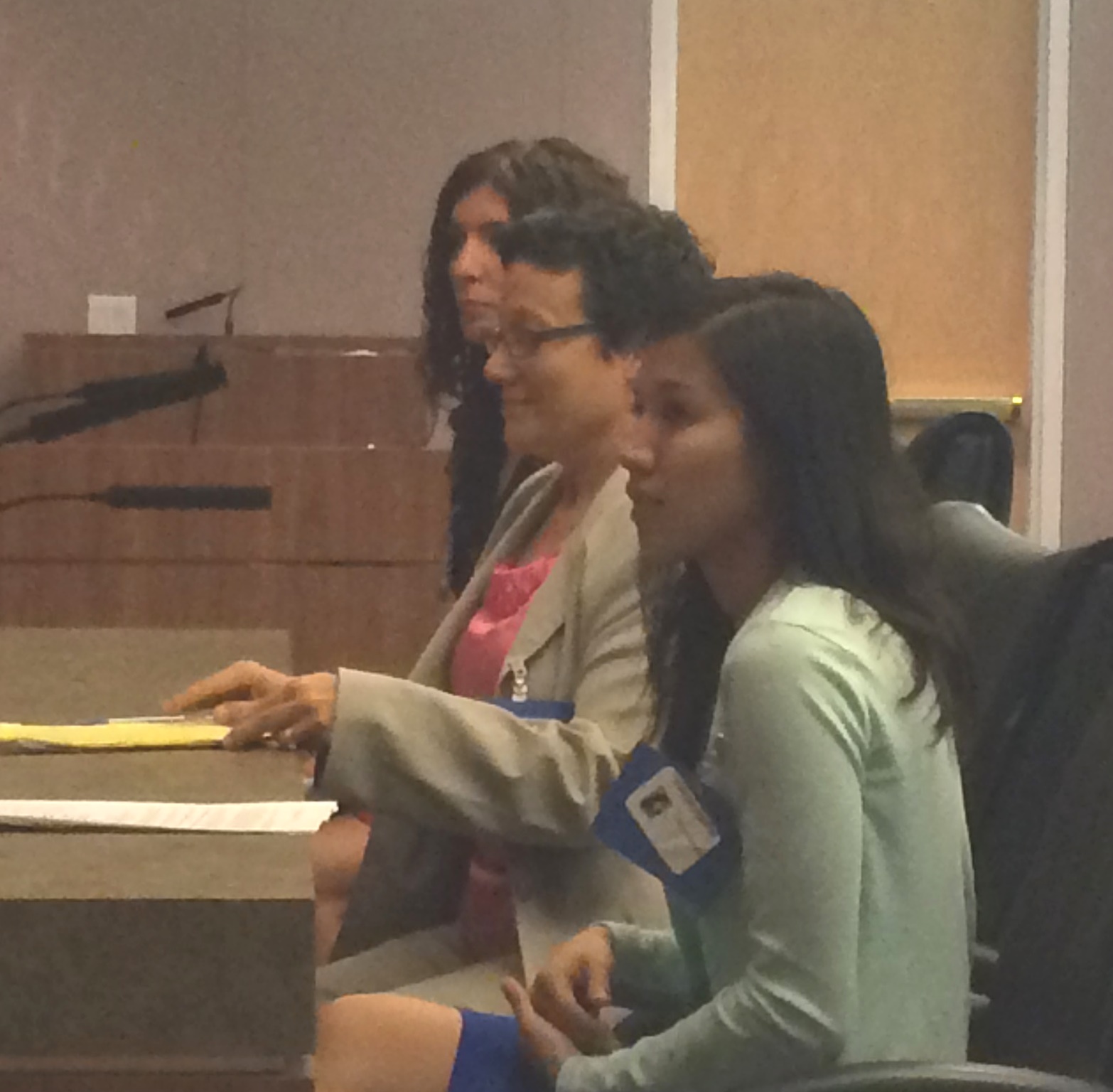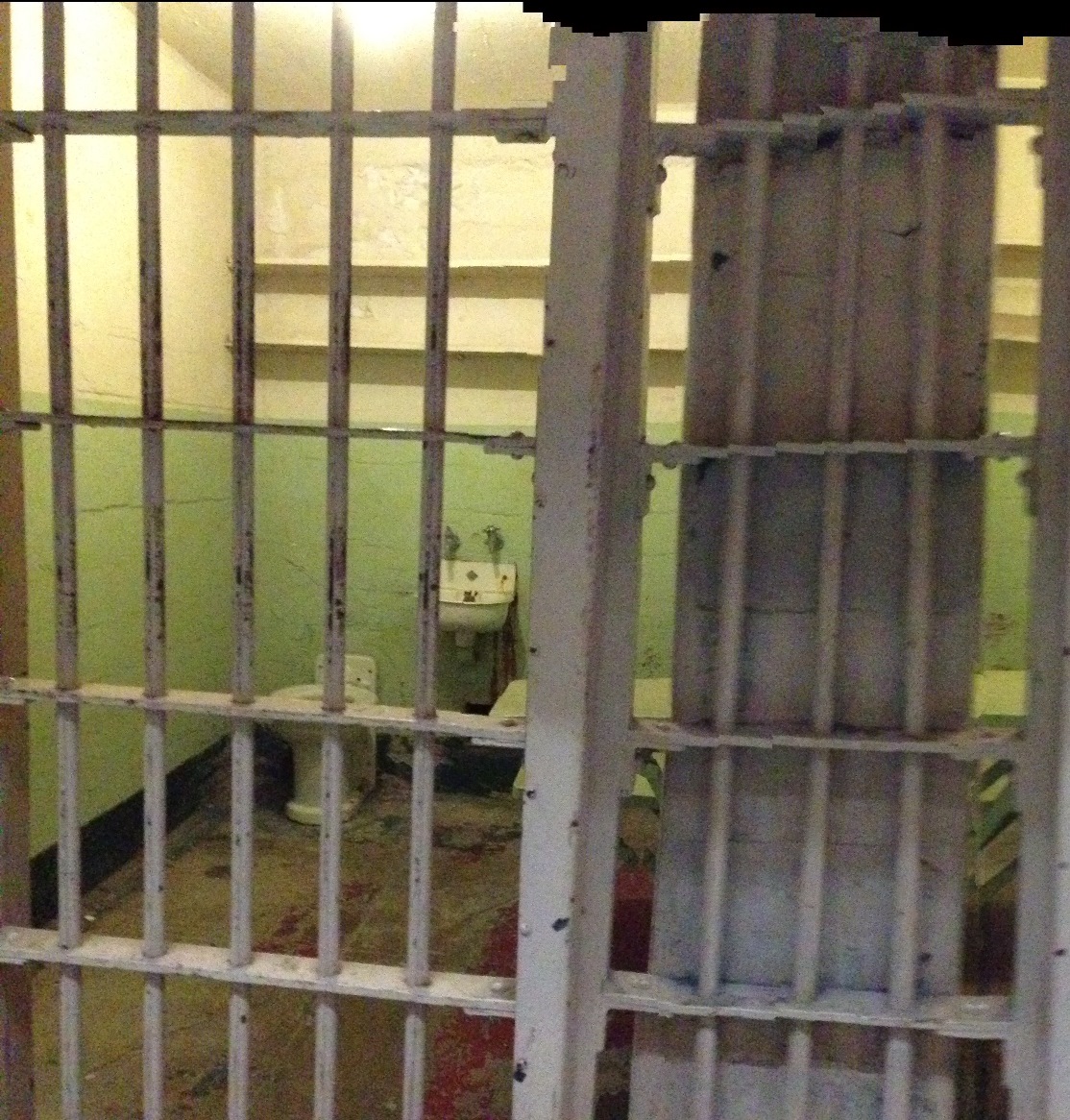By Audrey Redmond
Exonerating wrongfully convicted inmates and protecting the rights of the innocent are the core of NCIP’s work. NCIP currently maintains an active caseload of approximately 50 cases. The work is slow and often tedious. The following is an update of some of NCIP’s current cases, which are moving forward in the court system.
State Agency Approves Compensation for Larry Pohlschneider

NCIP Assistant Legal Director Maitreya Badami (center) is joined by two students at Larry Pohlschneider’s compensation hearing. Photo: Tiffany Zendejas
NCIP Assistant Legal Director Maitreya Badami and several NCIP students appeared before the California Victim Compensation and Government Claims Board on April 21 to represent NCIP exoneree Larry Polschneider in his compensation claim hearing. Mr. Pohlschneider was exonerated by NCIP in October 2015. He did not attend the compensation hearing because he was visiting his oldest daughter and her husband in Indiana and meeting his grandchild for the first time. After the NCIP team made a statement regarding the injustice that Mr. Pohlschneider endured during his 15 years spent wrongly incarcerated, the Board issued its recommendation that the state legislature compensate him. The Board will now submit to the state legislature its recommendation that Mr. Pohlschneider receive compensation from the State of California.
Court of Appeal Orders Response in Long-Standing NCIP Case
In April, the 6th District Court of Appeal ordered the Attorney General to respond to NCIP’s petition for writ of habeas corpus, filed on behalf of NCIP client Jack Sagin.
Mr. Sagin was wrongfully convicted in 1986 for the murder of a Monterey woman. There was no physical evidence or eyewitness testimony linking Mr. Sagin to the crime. The prosecution’s entire case rested on the testimony of two jailhouse “snitches,” both of whom provided testimony implicating Sagin, and both of whom spent their criminal careers snitching in order to improve their own situations. Snitch testimony is one of the leading causes of wrongful convictions – a contributing factor in more than 15 percent of wrongful convictions overturned through DNA testing, according to the Innocence Project.
Mr. Sagin maintained his innocence from the start. NCIP has been working on his case since 2002, initially investigating and then litigating for years to get post-conviction DNA testing of the evidence. DNA testing was important because the crime scene revealed a struggle between the victim and the perpetrator, and as a result, the perpetrator would likely have left DNA on the pieces of evidence tested.
The hard-won DNA testing showed that Mr. Sagin’s DNA was not present anywhere in the crime scene. That testing also revealed the presence of DNA from several other men on key pieces of evidence associated with the crime. The absence of Mr. Sagin’s DNA coupled with the presence of other men’s DNA strongly supports Mr. Sagin’s innocence claim and forms the basis for the pending habeas petition.
With this new DNA evidence, NCIP, along with pro bono partner Shearman and Sterling LLP, which joined the team in 2009, have challenged Mr. Sagin’s conviction throughout the California courts, without obtaining relief. In April, the 6th District Court of Appeal ordered the Attorney General to file a response to NCIP’s most recent petition. Briefing is ongoing, and the court will soon decide whether to grant a hearing to permit the parties to present this new evidence of innocence.
In the meantime, Jack Sagin, now 70, continues to sit in prison, waiting for justice.
Hearing Granted for NCIP Client Awaiting Justice
On April 19, an Alameda Superior Court judge issued an order granting an evidentiary hearing for NCIP client Karmal Howard.
Mr. Howard was wrongfully convicted in 2002 of an Oakland home invasion robbery based largely on the identification of one eyewitness, an 8-year-old child whose family was the victim of the robbery. Many of the classic factors known to undermine the reliability of eyewitness evidence were present here: a cross-racial identification, weapon focus, perpetrators in disguise, darkness and high stress. Under pressure from police, one of the actual perpetrators had falsely implicated Mr. Howard. At trial, the perpetrator recanted and denied that Mr. Howard was involved.
Mr. Howard has always maintained his innocence and diligently pursued his case, filing several petitions for writ of habeas corpus on his own behalf. His wife even attended paralegal school to help him prove his innocence, and she is the person who first reached out to NCIP on his behalf.
NCIP began looking into the case in 2011 and enlisted the assistance of pro bono counsel Goodwin Procter LLP. Together the team conducted a comprehensive re-investigation of the case, and discovered the identities of the two additional perpetrators who had never been apprehended.
Each of the actual perpetrators implicated himself and independently implicated the other two. The team discovered evidence that corroborates their version of the events and presented that new evidence to the Alameda Superior Court in a habeas corpus petition. The Alameda County DA’s office conceded that an evidentiary hearing was appropriate, and the hearing is set to begin June 20, 2016.
